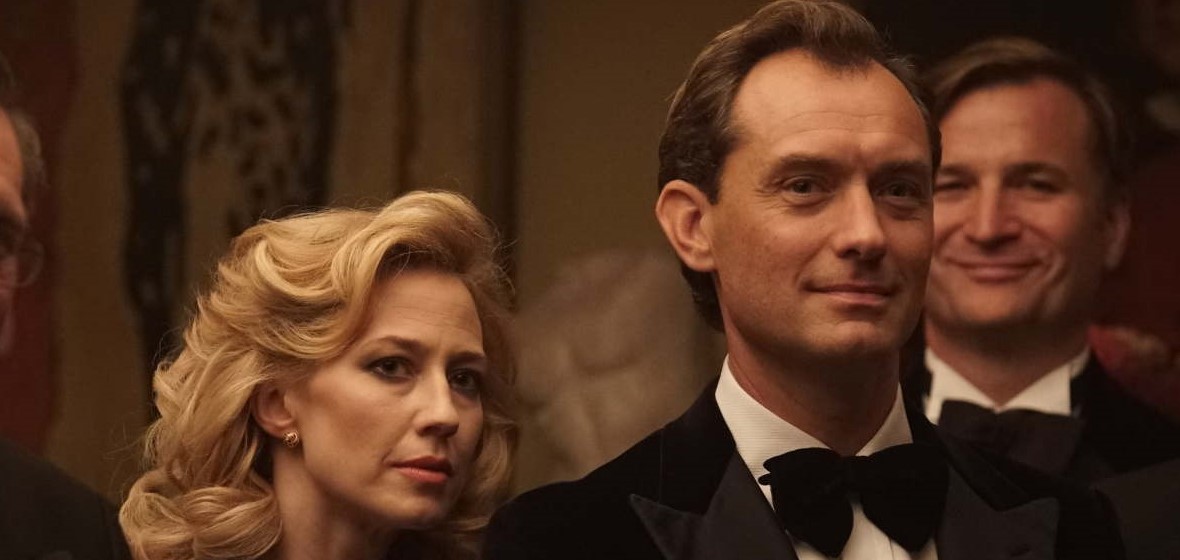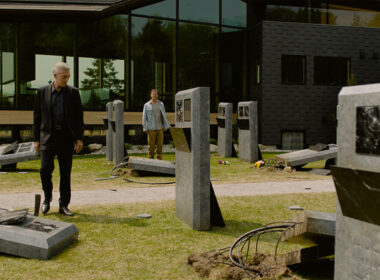Rating: ***
Young filmmakers ask the question “how well do you know your partner?” a little bit too often: as if it is common to be blindsided by a spouse, or honestly even that important of a question. Used in the horror genre, it helps to drive the feeling of weariness and loss the protagonist, and the audience, need. But in drama? It tiptoes too close to the edge of contrivance.
Take the O’Haras in The Nest. We meet them happily married with two children, living in New York. It’s the 1980s, Reagan’s shiny city upon a hill, all fertile ground for financiers, bankers, go-getters and investors like Rory (Jude Law) fashions himself to be. Somehow opportunities are not piling up, so he grabs a chance to move to London, only a couple of years before deregulation makes it paradise for financial institutions. His wife Allison (Carrie Coon) isn’t terribly fond of the idea, but a weak career prospect, and Rory’s convincing charms, change her mind. Before she knows it, the family settle on a large farm in Surrey. Its stone exterior, gravel driveways and paddocks and ponds are too large for a small family of four to fill up those walls.
Adapting to England is different depending who you talk to. While the children are dealing with their own cultural and emotional whiplash, for Rory, born and raised in London, it’s the place where he can explore his illusions of grandeur and status. Allison, very American, cannot stand the posh demeanour of the high society they’re now part of. Rory buys her a horse she can use to give riding lessons, the displaced animal a blatant metaphor for the state of Rory and Allison’s wedlock. Not even subtle, the sound of an unstable horse merges with an ominous soundtrack, pointing us to the drama to come.
For a sophomore feature, The Nest is an interesting choice for filmmaker Sean Durkin. You may remember his first, the tremendous Martha Marcy May Marlene that introduced us to the immense talent of Elizabeth Olsen. The link between the two films is that they centre on a female protagonist stuck in a destructive relationship. But while the first dealt with kidnapping and cult, The Nest is about marriage (and yes, I do believe the correlation is intentional).
The Nest is slower than its predecessor, but not necessarily less engaging. Durkin shoots domestic life like a horror film, with dark contrasts and long depths of field that catch every single spot of the mansion’s stripped, empty walls. A couple of times I expected something to appear in the background unbeknown to our characters, and it wouldn’t be too out of place if the third act had turned into a violent home invasion in the style of Lindsay Anderson. But, always well-contained, Durkin slowly devolves the plot around more uncomfortable moments where Rory’s desperate charm clashes with Allison’s rebellion.
There is an autobiographical flavour that can be traced down to Durkin’s past as a child moving back and forth between England and the US, but the personal may also be his downfall. When he focuses on the two married couples, how they antagonise each other instead of growing apart, the film radiates this dark bleak energy of toxicity that keeps it going. But there are too many distractions in other subplots that add little. In what is probably the best scene of the film, a long single shot of a domestic argument that would fit perfectly in a Tennessee Williams play is abruptly interrupted to tell us the kids were listening to it all. The cut so abrupt it yanks from the intense whirlwind; a beautifully framed, extremely well-acted moment of cinema blocked by a dramatic note that wasn’t part of it.
The Nest gets a lot right, though. Law’s charm slowly dissolves into sleaziness and desperation, and Coon vindicates her position as one of America’s most exciting undiscovered acting assets. Durkin and his cinematographer, Mátyás Erdély give the best masterclass in visual genre-bending since Paul Thomas Anderson’s There Will Be Blood, and the ending will leave you talking for a while. But Durkin’s thesis of a family crashing and burning misses a touch of nuance and raw emotion. It feels like he’s always close to hitting the final gut-punch that never comes. All the elements are there, but it’s a couple of stops away from delivering the ravaging emotional impact such build-up promises.
The Nest is now showing in selected cinema




